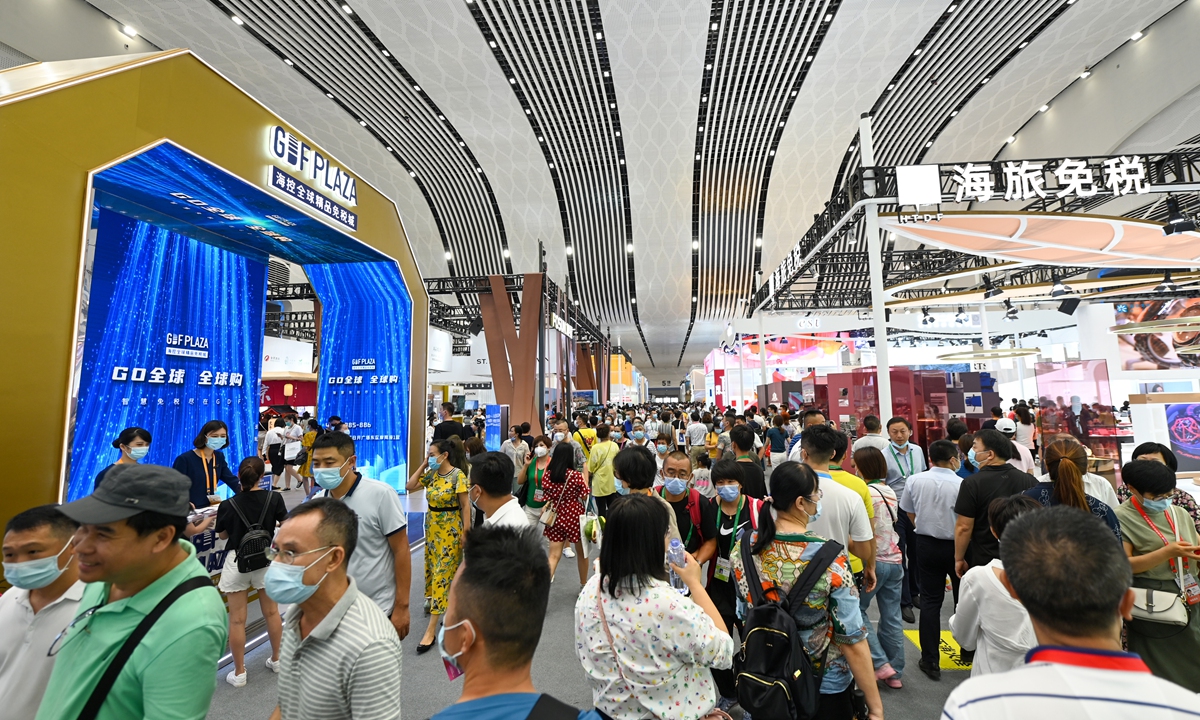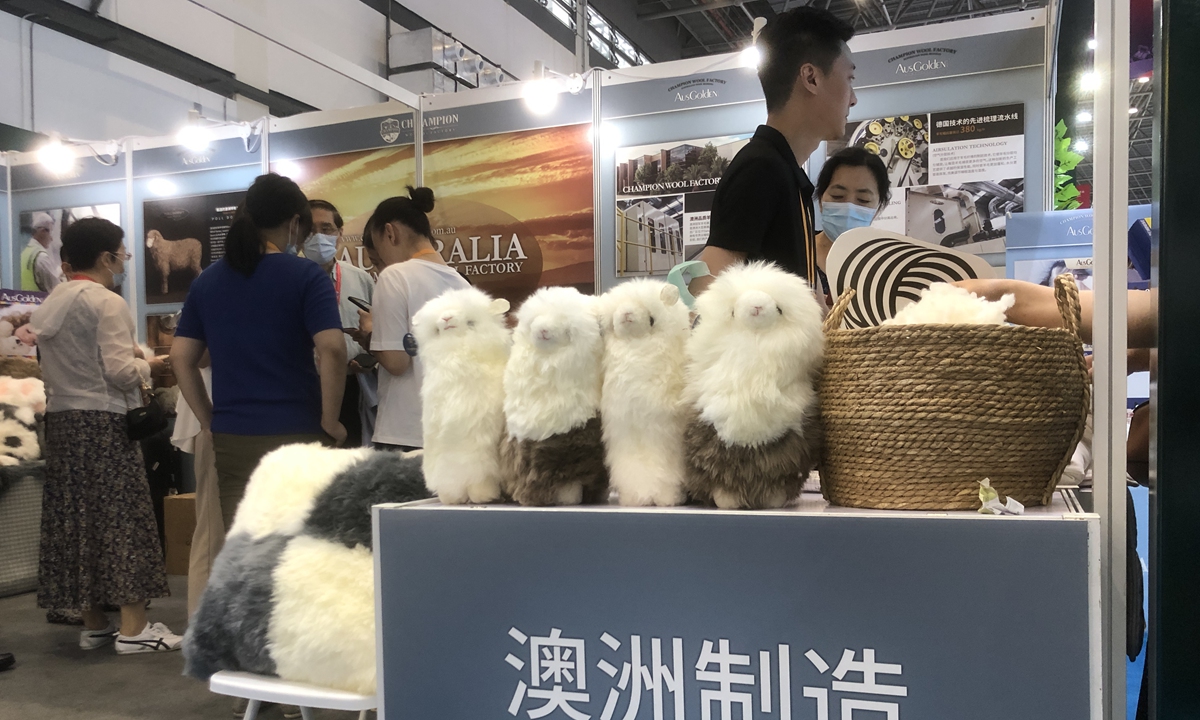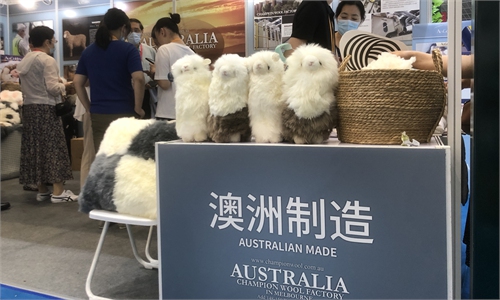Australian exporters hope rift with China will ease, eye opportunities in Chinese market
Despite tensions with China, exporters eye opportunity

Visitors tour around the first China International Consumer Products Expo (CICPE) in Haikou, capital of South China's Hainan Province over the weekend. Photo: VCG
Despite a downward spiral of bilateral relations between China and Australia that have caused rising difficulties for Australian exporters, they hold hopes that the rift could be eased as their commitment to the world's second largest economy remains.
A dozen Australian businesses, led by the Australian Trade and Investment Commission, engaged in various sectors from high-end health care and skin care to food and wine, attended the ongoing China International Consumer Products Expo (CICPE), which runs from May 7 to 10 in Haikou, capital city of South China's Hainan Province.
Wine is gone
One obvious change the Global Times spotted during the mega expo is that Australian wine brands dwindled starkly compared with their wide presence in the China International Import Expo (CIIE) held in Shanghai last November.
Wine products from other foreign countries such as France, Spain, Italy and New Zealand seem to be dominant at the expo, revving up efforts to expand their presence in the Chinese market as they pursue the business opportunities vacated by Australian wine, which has been under rising pressure since November when the preliminary anti-dumping rate of up to 212 percent was announced by Chinese authorities.
In March, China's customs started to impose anti-dumping duties from 116.2 percent to 218.4 percent on Australian wine. For some time, dumping and subsidies have occurred on imported Australian wine, which has caused substantial damage to the Chinese wine industry.
Luis Lei, general manager of a wine trading firm based in Xiamen, East China's Fujian Province, which is mainly focused on shipping Spanish and Chilean wine to the Chinese market, told the Global Times on Saturday at an exhibition booth that the previous market share scenario that overseas wines share in China has vastly changed since late 2020: as Australian wine shipments to China plummeted, French and Chilean wine sales were soaring, quickly filling up the market void.
"We have seen that imported wine in the Chinese market has been on a downward trend since 2019, but robust growth momentum has started since the start of the year with China's consumption market returning to pre-pandemic levels," Lei said, calling the current consumption rise as "revenge" to release pent-up demand during virus-plagued 2020.
Australian winemakers shipped A$12 million ($9 million) of wine to China in the four months from December to March, down by 96 percent from A$325 million year-over-year, according to industry body Wine Australia.
China accounts for 39 percent of Australia's AU$3 billion wine exports, more than the combined value of the next four biggest markets - the US, the UK, Canada and New Zealand.
Ivy Yao, chairman and co-founder of AU Life International, an Australian based e-commerce platform, told the Global Times on Saturday that Australian wine products under one of the company's subsidiaries have suffered a sizable export drop to China, losing 90 percent on a yearly basis.
"Our shipments to China and sales climbed each year with double-digit growth since 2015 when the China-Australia Free Trade Agreement was reached, which set China's tariffs at zero for a majority of Australian goods," Yao said.
Facing the geopolitical dispute between the two countries, Yao said the firm will not back down on the presence of Chinese consumption which is continuing to upgrade.

Australian firm Champion Wool Factory presents its wool products during the CICPE on Saturday. Photo: VCG
Other goods are comingTo cushion the impact on its wine business, Yao said the firm is exploring exporting grape-related products like grape juice to China and transferring its original grapes to a third country.
It also launched ready-to-eat products with Australian grain-fed beef by partnering with enterprises in Central China's Hunan Province. The latter ensures the Australian imported products are more catered to Chinese consumer taste.
"Different from wine, our other products like dairy and healthcare goods are not affected," she added.
Blackmores, the Australian health supplement maker that entered China in 2012, has treated the market as a significant pillar of its growth strategy, with the company booking a 25 percent increase in revenues from the country in the second half of 2020.
The current dynamics between the two countries will "not cause us to change our business structure in China", Kitty Liu, managing director of Blackmores China, told the Global Times in an interview during the expo.
"The huge potential of consumption upgrade the country is now in... In particular, Chinese consumers tend to spend more in the health and nutrition sector in the post-virus era. Our focus is long-term operations in the market which has now become our biggest overseas market, and we will continue to invest in social impact in the years to come," she noted, adding that the firm has a plan to cooperate with domestic medical universities on eye health research and development.
From zero to over 100, the number of domestic business partners that a wool firm from Melbourne, Australia - Champion Wool Factory - has joined hands with has been on a quick rise since 2018 when the Australian firm attended the first CIIE in Shanghai.
Eric Dong, the company CEO, told the Global Times on Saturday that visitors' enthusiasm for the Australian-made wool products that it exhibits has far beat his expectations for the expo in Hainan.
"China-Australian trade and economic relations are highly complementary. The current challenge will bring uncertainties and concerns, but I hope it's temporary," Dong said.




